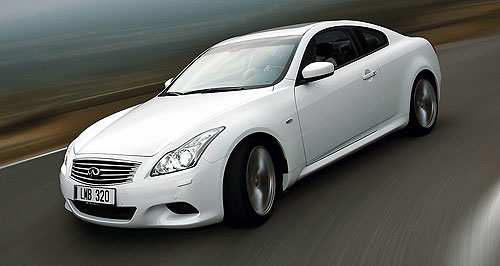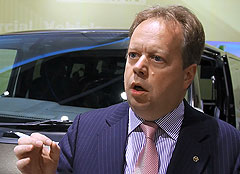Infiniti ‘an antidote’ to German vehicles
BY BYRON MATHIOUDAKIS | 12th Dec 2011

Speaking to the press at the Tokyo motor show late last month, Nissan executive vice-president Andy Palmer referred to his direct rivals as makers of cold, soulless and machine-like vehicles by comparison.
After a failed attempt to head off Lexus in 1993 with the Q45 full-sized luxury sedan, Infiniti will return to Australia in September 2012 with compact G37 Coupe and Convertible models, a mid-size M sedan and the FX mid-size SUV.
More models, including a small car to take on the Audi A3 and more crossover vehicles, are on their way from 2013.
“We tried to put Infiniti in a very different space to where our competitors are,” said Mr Palmer.
“Germans tend to be more mechanical, more cold, more Teutonic, soulless, and I would argue that some of my Japanese competitors would do perfect ‘Kaizen’ (continuous improvement) of German models.
“Infiniti tries to be something completely different on a performance scale it would be equal to BMW as a driver’s car but in terms of warmth and hospitality we are in our (own) space.
“If Germans use straight lines, we use curved lines sexy, sensuous, animal/human-like rather than machine-like. I would argue that we are the only group in that space, and that human-like quality manifests itself in our designs.”

“We tried to bring Asian hospitality, where the customer is god – it’s what we try to bring to the Infiniti brand.
“Yes, BMW is in the same space (in terms of performance). But add this hospitality, this sensuality, this humanistic rather than mechanical approach to the execution to the car, and I think these make us unique.
“Infiniti is the antidote to German luxury.” Meanwhile, Nissan design chief Shiro Nakamura defined Infiniti design as possessing more Japanese elements than even the parent brand, despite its global luxury market outlook.
“Infiniti is clearly a balance of elegance and power – and it is very important that we never lose that,” said Mr Nakamura.
“I would say that the interior is more Japanese – in the use of the materials and flowing lines that are inspired by Japanese traditional (elements) like a kimono or face of Kabuki.
“Infiniti is more rooted in Japanese culture while Nissan is more of an international product, so we want to put clear differentiation between the two brands.”